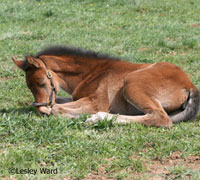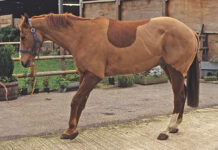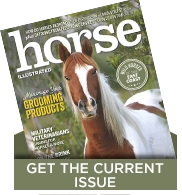
A new foal is an exciting bundle of potential. He could be your next loyal trail partner or show-ring superstar. Careful attention to a foal’s health during the critical first year will set the stage for his lifelong well-being.
The First Days
Once your foal is on the ground, don’t delay in having a vet out to examine him.
“A normal foal should be examined by a veterinarian within the first 12 to 24 hours of life,” says Kelly Carlson, DVM, of Rood & Riddle Equine Hospital in Lexington, Ky. During that initial visit, your vet will perform a thorough physical exam, listen to your foal’s abdomen; palpate his ribs, legs and umbilicus; and examine his eyes.
“The vet will closely examine the mare for trauma sustained during foaling and check for adequate milk production,” adds Carlson. “The placenta should also be examined to ensure that no portion remains within the mare’s uterus.”
A foal’s immune system is jumpstarted by the transfer of antibodies from his mother’s milk, and your vet will check to make sure that his antibody levels are healthy.
“The veterinarian will collect blood to check the foal’s immunoglobulin (IgG) level,” says Carlson. “One of the most common problems [in newborn foals] is a low IgG level, or failure of passive transfer. Foals absorb immunoglobulins from the mare’s colostrum [first milk] within the first 24 hours of life. Therefore, foals that have difficulty nursing or those born to mares with poor milk production are at a much higher risk of having inadequate IgG levels.”
Warning Signs
Even in the case of a normal, healthy foaling, you should have the vet out within the first day. There are certain cases where an emergency call to the vet is warranted.
“Young foals are more fragile than weanlings or adults, so their condition can rapidly deteriorate,” says Carlson. “Newborn foals that do not sit sternal within five minutes, stand within one to two hours, or nurse within three hours require immediate veterinary attention. Likewise, foals that show signs of colic, depression, decreased interest in nursing or lameness should be evaluated by a veterinarian.”
If your foal shows signs of abdominal pain, it may indicate meconium impaction.
“Meconium is the first feces that foals pass following birth,” explains Carlson. “Meconium is dark brown and forms small, firm fecal balls that can sometimes be difficult for the foal to pass. Medication, enemas and intravenous fluids are sometimes required to resolve meconium impactions.”
Vet attention is also essential to treat a common eye problem in newborns called entropion.
“Entropion occurs when the lower eyelid rolls in toward the eye,” says Dr. Carlson. “This can result in the eyelashes scratching the eye and causing a corneal ulcer. Depending on your veterinarian’s preference, the entropion may be corrected with placement of absorbable sutures or by injecting medication into the lower eyelid. The goal is to roll the lower eyelid out to prevent damage to the cornea.”
Vaccinations for Foals
As with adult horses, the exact vaccines your foal will receive depend on his specific risk factors based on geographic location and his dam’s history. Foal owners should talk to their veterinarian to create an optimal vaccination plan.
“In general, foals that are born to appropriately vaccinated mares will receive their first round of vaccinations at 4 to 6 months of age,” says Carlson. “Foals that are born to unvaccinated mares should receive their first round of vaccinations at 3 to 4 months of age. All foals will require multiple doses—usually two to three—of each vaccine to develop immunity. The specific timing and number of doses required is dependent on the type of vaccine administered.
“All foals should receive core vaccinations against tetanus, Eastern and Western equine encephalitis, west nile virus and rabies,” continues Carlson. “Additional vaccines, such as equine herpes virus, equine influenza virus, or botulism, may also be administered based on the foal’s risk of exposure. Additional vaccination guidelines are available through the American Association of Equine Practitioners (AAEP).”
To view the AAEP’s current foal vaccination chart, click here.
Parasite Control
As with your vaccination schedule, you’ll need to discuss your deworming program with your veterinarian to determine what will be safe and effective for your foal without increasing the risk of chemical resistance in parasite populations.
“In general, foals should not be dewormed prior to 60 days of age, as most of the deworming products (anthelmintics) that are safe for use in foals are ineffective against immature roundworms,” explains Dr. Carlson. “Roundworms mature into adults between 8 and 12 weeks of age, at which point anthelmintics can be effective.
“Fecal egg counts are very useful for determining if anthelmintics were effective against the parasite load and to help determine future anthelmintic treatments,” adds Carlson. “Parasite resistance is an increasing problem in many areas, so the specific anthelmintic product used will vary by location. Moxidectin (found in Quest brand dewormer) should not be used in foals less than 6 months of age.”
Learn more about fecal egg counts in the Horse Health College Session 100 course, Parasite Control Strategies.
Get your vet involved in developing your foal-care plan, and your youngster is sure to have a long, healthy and productive life.






Excellent.